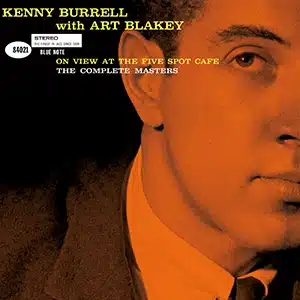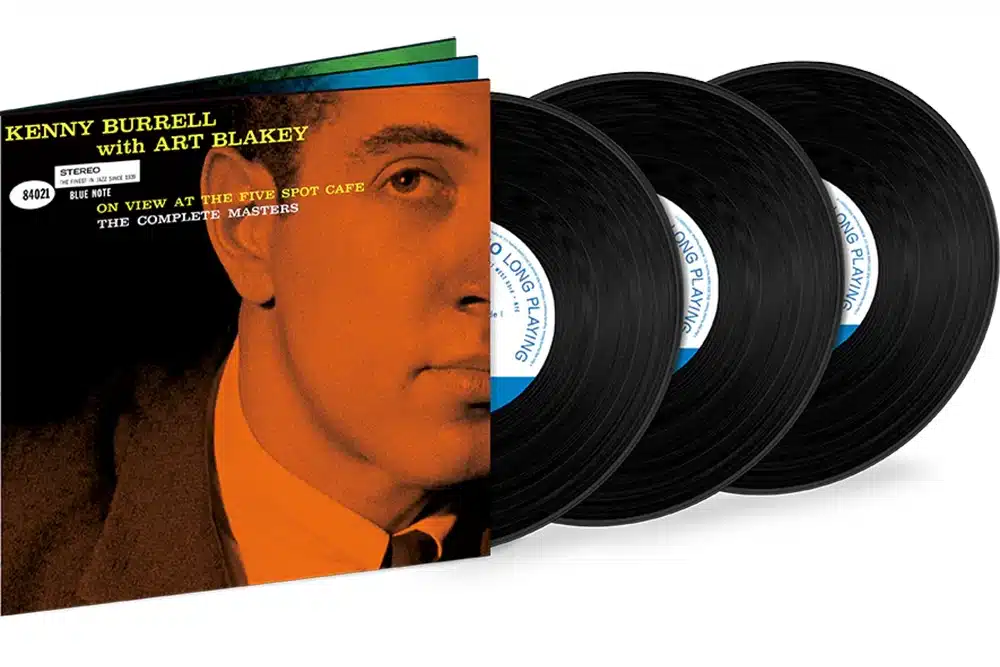
Since there is not a lot of golden-era jazz music left in the vaults, the question begged by the constant stream of reissues is, Why? There is money, of course. However, many classic jazz titles, including those on Blue Note, are now available in inexpensive, off-label versions thanks to EU copyright law. To entice collectors and newcomers into paying a premium for the “real thing”, labels like Blue Note need to provide an extra incentive. That can include better packaging, remastered or improved sound, and unique archival material. Kenny Burrell’s On View at the Five Spot Café: The Complete Masters hits on all three of these.
On View at the Five Spot Café, recorded in August 1959, was initially released the following year and has since been reissued multiple times, sometimes with added material. The Complete Masters provides just that, compiling everything recorded during the multi-set, one-night stand. Crucially, though, it goes further, providing context and interpretation that only serve to enrich the recordings once you press “play”. You could come into The Complete Masters knowing nothing about the venue, the musicians, or the cultural context, and come away feeling almost as if you might as well have been in the audience.
Not many folks had that honor, though. The Five Spot, a former Bowery, Manhattan café that its owners had converted into a jazz club in 1956, seated only 75 people. Yet, as critic Syd Schwartz’s new essay makes clear, in a few short years it had established itself at the forefront of form, having facilitated comebacks by luminaries Thelonious Monk and John Coltrane by hosting a residency for the pair. Monk and Coltrane also represented a sometimes turbulent transition from the then-dominant hard bop style to more exploratory ventures in modal playing and dissonance. Within a few months of On View at the Five Spot Café‘s recording, free jazz figurehead Ornette Coleman would himself begin an extended residency.
It was into this rather dynamic milieu that guitarist Kenny Burrell came to the Five Spot. Burrell is the main attraction here. His clean, crystalline lines also have enough bite to engage. Even people who don’t like jazz guitar will enjoy him, and his work on the ballad “Lover Man” in particular is breathtakingly exquisite.
His co-leader (billed that way, as Burrell tells it, to capitalize on the name recognition of both men) is drummer Art Blakey, who, with his Jazz Messengers troupe, was synonymous with hard-bop. Filling out the rhythm section are bassist Ben Tucker and pianist Roland Hanna, both making their recorded debuts. On some occasions, fellow Messenger Bobby Timmons fills in for Hanna, and the quartet are joined by tenor saxophonist Tina Brooks.
What is immediately striking about On View at the Five Spot Café is its laid-back, comfortable, almost casual feel. Slow to mid-tempo blues numbers and ballads dominate. Blakey, an explosive drummer whose detractors called him overbearing, often stays on the down-low, keeping metronomic time and occasionally punctuating the numbers with his signature snare press rolls. When Blakey does get going on the uptempo numbers, he commands attention.
Blakey had already recorded a couple of percussion-heavy albums that took in his fascination with African and Latin percussion. Those influences are readily apparent on his superb extended solo on the show tune “Hallelujah”, where his mallet pounding smolders with tribal energy. On Clifford Brown’s bebop number “Swingin'”, Blakey, no longer able to restrain himself, slices and dices his way through Brooks’ attempt to solo.
This bit of disarray is just one reminder that these musicians, who would never play again in this configuration, were likely unrehearsed. This reality is underscored by the trio of alternate takes, especially the show-closing version of Kenny Burrell’s “36-23-36”, on which everyone sounds exhausted and/or drunk, yet still exudes a languid charisma.
As for the other previously unreleased material, it’s easy to see why the Gershwins’ saccharine “Love Walked In” was left off; it doesn’t fit the mood. “The Next Time You See Me, Things Won’t Be the Same,” a contemporary pop hit, is also jaunty but gives Burrell a chance to showcase his blues chops. Burrell’s “The Take Off” is the best of the bunch, with Hanna’s barrel-roll solo and Blakey’s controlled-demo fills matching wits with the guitarist.
In addition to the complete set list and Schwartz’s essay, “On View at the Five Spot Café: The Complete Masters” provides further context. Joe Goldberg’s original liner notes, enlivened track-by-track commentary from Schwartz, and a new interview with Kenny Burrell, still swinging at age 93, all add up to make the collection feel more like a warm vignette than a cynical freeze-frame. This is one occasion where digital files simply won’t suffice.

